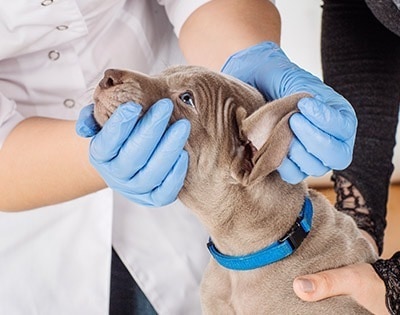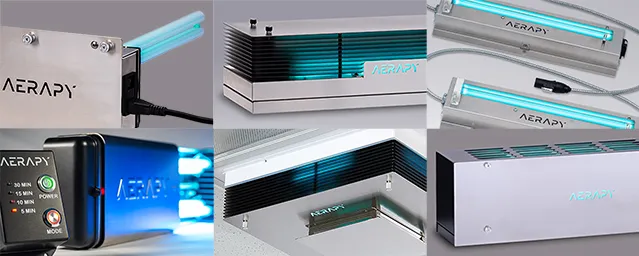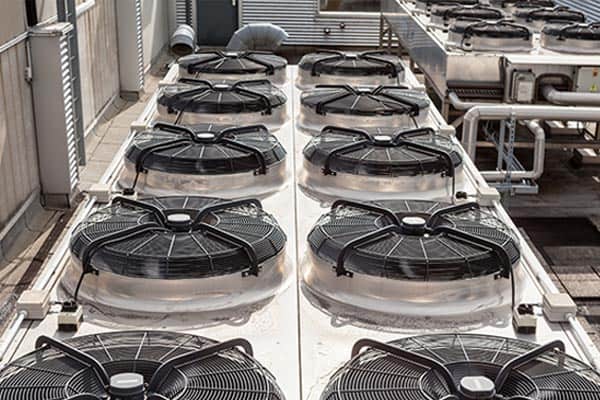
What is Kennel Cough?
Kennel cough is a highly contagious, airborne upper respiratory infection that can be contracted virtually anywhere dogs are gathered. It is usually not fatal, but it does cause symptoms that make an infected dog (and their human caregivers) quite miserable. An outbreak of kennel cough can lead to animal care facility closures which is why pet boarding and dog daycare facilities, veterinary clinics, groomers, animal shelters, or locations where other dogs are present need protocols in place to help prevent its spread.
Also known as:
Canine Cough, K9 Cough, Bordetella, Canine Infectious Respiratory Disease Complex (CIRDC), Canine Infectious Tracheobronchitis
Aerapy Animal Health’s UV sanitizing technology was specifically tested against kennel cough (Bordetella bronchiseptica) and achieved a 99.94% kill rate.
Visit our Research & Studies page to learn more.
What causes kennel cough?
Kennel cough refers to a group of diseases and can be caused by several different infectious agents, many of which may affect the dog simultaneously. The exact culprit is often not diagnosed unless the pet is not responding to treatment, the condition is more severe than expected, or multiple pets are involved.
A common culprit is a bacteria called Bordetella bronchiseptica but in the majority of cases other bacteria or viruses will be involved. Other bacterial causes may include Mycoplasma spp. or Streptococcus zoopidemicus. Viral causes may include adenovirus-2, parainfluenza, corona respiratory virus, herpes virus, and neumovirus.
It is important to note that the pet’s environment, as well as their own immune response, will play a role in development of the clinical condition, just as in humans when exposed to a cold virus. Not everyone that comes in contact with another person with a cold will get a cold but, if stressed or immune deficient, the person is much more likely to develop clinical symptoms. The same is true for pets. Regardless of how nice or comfortable a pet boarding facility, animal shelter, grooming salon or veterinary hospital is, these situations often create some level of stress. This is where minimizing stress as much as possible becomes important.
How is kennel cough transmitted?
The environment and a pet’s immune system can impact spread of the illness but understanding how it is spread and what can be done to minimize disease transfer is also critical. Kennel cough, as with many other infectious conditions, can be transmitted through multiple routes.
Spread through the air.
Kennel cough, as an airborne disease, is primarily spread through the air. When an infected dog coughs, sneezes, barks, or even sheds dander he releases thousands of microscopic contaminates into the air. The aerosolized bacteria and viruses can remain viable (alive and able to infect) in the air for extended periods of time, even for weeks in some instances, and, although rarely, even longer. These virtually invisible pathogens cling to tiny dust particles, riding on air currents, and traveling throughout the environment until inhaled by another host.
Contact with contaminated objects (or people).
If an infected dog drinks from a watering dish, picks up a toy or stick, sleeps on a bed, and then another dog comes in contact with these objects, he will most likely be exposed to kennel cough. People, and their clothing, can also serve as a source of transmission if they do not disinfect their hands and clothing between pets. Bacteria, like Bordetella, can survive on surfaces for up to 48 hours, ready and waiting to be transmitted to another unsuspecting host to continue the cycle of infection. Exposure does not necessarily mean infection but it does open the door for a pet to transmit the condition.
Direct contact with infected dogs.
Be careful who your dog associates with and where he hangs out! Touching noses, playing with friends, or just breathing the same air as an infected dog can cause your best friend to develop kennel cough. Dog daycare and dog boarding facilities, kennels, veterinary hospitals, dog grooming salons, and other pet businesses where numerous dogs are coming and going or kept in close quarters must take extra precautions to protect their facilities from the transmission of kennel cough.
What are the symptoms of kennel cough?
The most common symptoms of kennel cough include:
How long does kennel cough last?
Most dogs recover from kennel cough within 3–4 weeks. If a dog has a compromised immune system, is a young puppy or a senior, it may take up to 6 weeks for a complete recovery. However, the dog may still be a carrier of the disease for several weeks after he has recovered. The answer to exactly how long kennel cough lasts truly depends on the individual dog, but 3–6 weeks is a common timeframe.
What is the impact of kennel cough?
For pet owners and pets, the impact of kennel cough can be quite significant. The recovery time for the pet can be quite frustrating and negatively impact the pet’s current quality of life. The pet will be considered infectious until fully recovered which limits his ability to interact with other pets in the household or attend any group play or training activities the pet is involved in. This can be difficult for many pet owners who have multiple pets. In rare situations, cats and people can also contract kennel cough from dogs and thus additional health concerns are present. Treatment may also require multiple vet visits, multiple tests, and medications which are time consuming and financially significant for many pet owners.
For pet care facilities (boarding, day play, etc.), the concern goes well beyond simply cost. The consequences of an outbreak can be much more devastating. Pet care facilities that experience an outbreak of kennel cough may need to temporarily shut down. This means lost revenue, decreased customer satisfaction, and a damaged business reputation. Clients, repeat business, and referrals are lost. Although the kennel cough outbreak may not be any fault of the facility itself, the effects can greatly deteriorate both the business and its income stream.
For animal shelters or rescues, kennel cough can spread throughout the facility and be a significant expense for the organization. The condition can also increase the length of stay of a pet within the facility which impacts labor and sheltering costs, negatively impacting the number of pets the organization can help. Adopting families can also be impacted if pets are adopted prior to the onset of clinical signs inadvertently contaminating the adopter’s other pets and home. While not always able to prevent situations like this, minimizing the frequency is important to the reputation and success of the facility.
How can kennel cough and other infectious diseases be prevented?
Prevention of kennel cough, along with other infectious diseases, depends on everyone doing their part. The following explains how it can be done.
Boarding Facilities, Veterinary Clinics, and Animal Shelters
There are ways you can protect your animal care facility by being proactive in the prevention of kennel cough and other infectious diseases. All of these methods are critical. All should be used.
Understand issues in your area. Strong partnerships with local veterinarians, regular monitoring of animal-related media, and partnerships with other pet businesses will help alert you to any issues that may be on the rise in your area. Based on this information, a facility may decide to require different vaccinations, implement different pet evaluation protocols or, at a minimum, educate staff of what to look for in the event a pet should get sick.
Have vaccination protocols that meet the needs of your business and surrounding geographic area. Consult with your local veterinarians for vaccine information. Ensure pets are vaccinated before intake and educate owners on why this is important.
Staff education. It is critical that animal care businesses train all staff members on disease recognition and protocols for handling ill pets. Often, kennel attendants and daycare staff will be the first to recognize an issue in a pet. Education on proper sanitation and disease prevention is also critical as staff can easily transmit illness from one pet to the next.
Disease protocols. Animal care facilities should have written protocols on how to handle a pet that is showing signs of illness. Immediate isolation of a dog that is showing symptoms is the very first step to keeping the disease contained and limit the chances of an outbreak in your facility. All pet care facilities should have a quarantine room (or area) and a separate entrance/exit for infected dogs.
Sanitation and disinfection protocols. Proper sanitation techniques are key in preventing and containing illness.
AIR DISINFECTION
Because airborne transmission is the primary transmission route for kennel cough, sanitizing the air is a critical part of disease prevention. Surprisingly, this is often the most often neglected area of an animal care facility’s disinfection routine. Air disinfection includes:
- Using the proper size air filters and changing on a regular interval.
- Ensuring proper air circulation within the facility.
- Ensuring air from isolation areas are not shared with the general facility.
- Using properly sized UV air sanitizing systems that can achieve a 99.9% kill rate in one air pass.
- Enhancing surface cleaning by reducing the number of pathogens in the air before they can land on surfaces. Learn more about how germs are spread.
RIGOROUS SURFACE DISINFECTION
Because kennel cough (as well as other diseases) can survive for up to 48 hours on surfaces, it is important to clean and disinfect counters, tables, floors, walls, cages, bowls, toys, and other surfaces on a regular basis and between handling different pets. Surface disinfection also applies to human hands and clothing that can likewise serve as a source of transmission. Associates must be trained on how to clean and on protection protocols for prevention of disease spread. Even the order in which one cleans can impact the spread of disease.
While UV systems have been around for some time (they have a long history in human healthcare environments), there is still limited knowledge of their benefit in pet care. While disinfecting surfaces and washing hands are all an important part of prevention, as discussed above, airborne transmission is the primary way kennel cough is spread. Infectious pathogens can survive on dust particles and dander for extended periods of time. Effective air cleaning systems that will kill infectious pathogens, while being safe for humans and animals, must be designed and properly sized for animal care facilities and specifically tested to help eliminate pathogens.
Aerapy Animal Health has developed unique, one-of-kind air purifying systems designed to help destroy the harmful microbes that threaten the health of your facility. Our proprietary, commercial grade UV air cleaning units have been independently tested and proven effective against pet pathogens.
What should you do if you suspect kennel cough or other infectious disease in your facility?
First and foremost, it is critical that sick pets in the facility be examined by a veterinarian. It may be necessary to have your veterinarian perform diagnostic tests on sick pets to better understand what is present. Without knowing what is causing illness, it makes it difficult to prevent further illness and ensure pets receive the proper treatment.
If an animal shelter, boarding kennel, or other pet care facility develops an outbreak, the entire facility may need to temporarily shut down. Isolation of sick pets is critical. Pets that have been exposed but are not showing clinical symptoms should also be kept separate from new incoming pets. Based on the configuration of the facility, if you cannot properly separate these groups, closing the facility may be the best option to prevent further spread. Often, facilities will try to separate the sick pets but fail to recognize that exposed pets can be contagious prior to showing clinical symptoms. In fact, it is during this period that they are most infectious—keeping exposed pets separate from non-exposed pets is critical.
It is also important to understand that exposure does not require direct contact with a sick pet but that pets can be exposed by air flow so any pet that is in a room with the same ventilation as a sick pet is considered exposed.
Pet Owners
Choose a dog boarding, kennel, dog day care, or other animal care facility with caution. Do your homework! Getting recommendations from people you trust and reading online reviews is just a first step. Request a tour of the facility so that you can make sure it looks neat and clean, and is sanitized regularly, properly, and thoroughly. Ensure that the facility has vaccination and health requirements for pets in the facility.
Follow vaccination recommendations of your veterinarian. For dogs that frequently come in contact with other dogs (grooming, boarding, dog parks, daycare, or training), the kennel cough (Bordetella) vaccination is typically highly recommended. While the vaccine will not completely eliminate the risk of a pet contracting the illness, it remains a key component of protection for a pet. Ensuring your pet is vaccinated a minimum of one week prior to exposure, or as recommended by your veterinarian, will help ensure the vaccine has the best chance of being effective.
Keep pets that have symptoms isolated from other pets. It is very challenging to isolate sick pets once they begin feeling better but until they have been completely cleared it is important to not have them around other pets.
How is kennel cough treated?
The following is not intended as a substitute for professional medical advice, diagnosis, or treatment for your pet. Consult your veterinarian for questions and information regarding your pet’s health.
Pets with suspected canine cough should be evaluated by a veterinarian for the best treatment protocol. Veterinarians will perform a variety of tests to determine what medications are needed. Tests may include lung x-rays, blood tests and/or cultures. Treatment typically involves both supportive care as well as medications. Your veterinarian can prescribe antibiotics to help your dog recover. Some of the most widely prescribed antibiotics for kennel cough include Baytril, Doxycycline, and Clavamox. Antibiotics will not affect the viral aspect of the illness (that is, they won’t prevent its spread) but will help treat secondary bacterial infections. Depending on the severity of the cough, veterinarians may also prescribe cough suppressants or other supportive care therapies. Providing a low stress environment with supportive care is essential in the treatment of kennel cough.
KENNEL COUGH QUICK LINKS
What causes kennel cough?
Kennel cough refers to a group of diseases and can be caused by several different infectious agents, many of which may affect the dog simultaneously. The exact culprit is often not diagnosed unless the pet is not responding to treatment, the condition is more severe than expected, or multiple pets are involved.
A common culprit is a bacteria called Bordetella bronchiseptica but in the majority of cases other bacteria or viruses will be involved. Other bacterial causes may include Mycoplasma spp. or Streptococcus zoopidemicus. Viral causes may include adenovirus-2, parainfluenza, corona respiratory virus, herpes virus, and neumovirus.
It is important to note that the pet’s environment, as well as their own immune response, will play a role in development of the clinical condition, just as in humans when exposed to a cold virus. Not everyone that comes in contact with another person with a cold will get a cold but, if stressed or immune deficient, the person is much more likely to develop clinical symptoms. The same is true for pets. Regardless of how nice or comfortable a pet boarding facility, animal shelter, grooming salon or veterinary hospital is, these situations often create some level of stress. This is where minimizing stress as much as possible becomes important.
How is kennel cough transmitted?
The environment and a pet’s immune system can impact spread of the illness but understanding how it is spread and what can be done to minimize disease transfer is also critical. Kennel cough, as with many other infectious conditions, can be transmitted through multiple routes.
Spread through the air.
Kennel cough, as an airborne disease, is primarily spread through the air. When an infected dog coughs, sneezes, barks, or even sheds dander he releases thousands of microscopic contaminates into the air. The aerosolized bacteria and viruses can remain viable (alive and able to infect) in the air for extended periods of time, even for weeks in some instances, and, although rarely, even longer. These virtually invisible pathogens cling to tiny dust particles, riding on air currents, and traveling throughout the environment until inhaled by another host.
Contact with contaminated objects (or people).
If an infected dog drinks from a watering dish, picks up a toy or stick, sleeps on a bed, and then another dog comes in contact with these objects, he will most likely be exposed to kennel cough. People, and their clothing, can also serve as a source of transmission if they do not disinfect their hands and clothing between pets. Bacteria, like Bordetella, can survive on surfaces for up to 48 hours, ready and waiting to be transmitted to another unsuspecting host to continue the cycle of infection. Exposure does not necessarily mean infection but it does open the door for a pet to transmit the condition.
Direct contact with infected dogs.
Be careful who your dog associates with and where he hangs out! Touching noses, playing with friends, or just breathing the same air as an infected dog can cause your best friend to develop kennel cough. Dog daycare and dog boarding facilities, kennels, veterinary hospitals, dog grooming salons, and other pet businesses where numerous dogs are coming and going or kept in close quarters must take extra precautions to protect their facilities from the transmission of kennel cough.
What are the symptoms of kennel cough?
The most common symptoms of kennel cough include:
How long does kennel cough last?
Most dogs recover from kennel cough within 3–4 weeks. If a dog has a compromised immune system, is a young puppy or a senior, it may take up to 6 weeks for a complete recovery. However, the dog may still be a carrier of the disease for several weeks after he has recovered. The answer to exactly how long kennel cough lasts truly depends on the individual dog, but 3–6 weeks is a common timeframe.
What is the impact of kennel cough?
For pet owners and pets, the impact of kennel cough can be quite significant. The recovery time for the pet can be quite frustrating and negatively impact the pet’s current quality of life. The pet will be considered infectious until fully recovered which limits his ability to interact with other pets in the household or attend any group play or training activities the pet is involved in. This can be difficult for many pet owners who have multiple pets. In rare situations, cats and people can also contract kennel cough from dogs and thus additional health concerns are present. Treatment may also require multiple vet visits, multiple tests, and medications which are time consuming and financially significant for many pet owners.
For pet care facilities (boarding, day play, etc.), the concern goes well beyond simply cost. The consequences of an outbreak can be much more devastating. Pet care facilities that experience an outbreak of kennel cough may need to temporarily shut down. This means lost revenue, decreased customer satisfaction, and a damaged business reputation. Clients, repeat business, and referrals are lost. Although the kennel cough outbreak may not be any fault of the facility itself, the effects can greatly deteriorate both the business and its income stream.
For animal shelters or rescues, kennel cough can spread throughout the facility and be a significant expense for the organization. The condition can also increase the length of stay of a pet within the facility which impacts labor and sheltering costs, negatively impacting the number of pets the organization can help. Adopting families can also be impacted if pets are adopted prior to the onset of clinical signs inadvertently contaminating the adopter’s other pets and home. While not always able to prevent situations like this, minimizing the frequency is important to the reputation and success of the facility.
How can kennel cough, and other infectious diseases, be prevented?
Prevention of kennel cough, along with other infectious diseases, depends on everyone doing their part. The following explains how it can be done.
Boarding Facilities, Veterinary Clinics, and Animal Shelters
There are ways you can protect your animal care facility by being proactive in the prevention of kennel cough and other infectious diseases. All of these methods are critical. All should be used.
Understand issues in your area. Strong partnerships with local veterinarians, regular monitoring of animal-related media, and partnerships with other pet businesses will help alert you to any issues that may be on the rise in your area. Based on this information, a facility may decide to require different vaccinations, implement different pet evaluation protocols or, at a minimum, educate staff of what to look for in the event a pet should get sick.
Have vaccination protocols that meet the needs of your business and surrounding geographic area. Consult with your local veterinarians for vaccine information. Ensure pets are vaccinated before intake and educate owners on why this is important.
Staff education. It is critical that animal care businesses train all staff members on disease recognition and protocols for handling ill pets. Often, kennel attendants and daycare staff will be the first to recognize an issue in a pet. Education on proper sanitation and disease prevention is also critical as staff can easily transmit illness from one pet to the next.
Disease protocols. Animal care facilities should have written protocols on how to handle a pet that is showing signs of illness. Immediate isolation of a dog that is showing symptoms is the very first step to keeping the disease contained and limit the chances of an outbreak in your facility. All pet care facilities should have a quarantine room (or area) and a separate entrance/exit for infected dogs.
Sanitation and disinfection protocols. Proper sanitation techniques are key in preventing and containing illness.
AIR DISINFECTION
Because airborne transmission is the primary transmission route for kennel cough, sanitizing the air is a critical part of disease prevention. Surprisingly, this is often the most often neglected area of an animal care facility’s disinfection routine. Air disinfection includes:
- Using the proper size air filters and changing on a regular interval.
- Ensuring proper air circulation within the facility.
- Ensuring air from isolation areas are not shared with the general facility.
- Using properly sized UV air sanitizing systems that can achieve a 99.9% kill rate in one air pass.
- Enhancing surface cleaning by reducing the number of pathogens in the air before they can land on surfaces. Learn more about how germs are spread.
RIGOROUS SURFACE DISINFECTION
Because kennel cough (as well as other diseases) can survive for up to 48 hours on surfaces, it is important to clean and disinfect counters, tables, floors, walls, cages, bowls, toys, and other surfaces on a regular basis and between handling different pets. Surface disinfection also applies to human hands and clothing that can likewise serve as a source of transmission. Associates must be trained on how to clean and on protection protocols for prevention of disease spread. Even the order in which one cleans can impact the spread of disease.
While UV systems have been around for some time (they have a long history in human healthcare environments), there is still limited knowledge of their benefit in pet care. While disinfecting surfaces and washing hands are all an important part of prevention, as discussed above, airborne transmission is the primary way kennel cough is spread. Infectious pathogens can survive on dust particles and dander for extended periods of time. Effective air cleaning systems that will kill infectious pathogens, while being safe for humans and animals, must be designed and properly sized for animal care facilities and specifically tested to help eliminate pathogens.
Aerapy Animal Health has developed unique, one-of-kind air purifying systems designed to help destroy the harmful microbes that threaten the health of your facility. Our proprietary, commercial grade UV air cleaning units have been independently tested and proven effective against pet pathogens.
What should you do if you suspect kennel cough or other infectious disease in your facility?
First and foremost, it is critical that sick pets in the facility be examined by a veterinarian. It may be necessary to have your veterinarian perform diagnostic tests on sick pets to better understand what is present. Without knowing what is causing illness, it makes it difficult to prevent further illness and ensure pets receive the proper treatment.
If an animal shelter, boarding kennel, or other pet care facility develops an outbreak, the entire facility may need to temporarily shut down. Isolation of sick pets is critical. Pets that have been exposed but are not showing clinical symptoms should also be kept separate from new incoming pets. Based on the configuration of the facility, if you cannot properly separate these groups, closing the facility may be the best option to prevent further spread. Often, facilities will try to separate the sick pets but fail to recognize that exposed pets can be contagious prior to showing clinical symptoms. In fact, it is during this period that they are most infectious—keeping exposed pets separate from non-exposed pets is critical.
It is also important to understand that exposure does not require direct contact with a sick pet but that pets can be exposed by air flow so any pet that is in a room with the same ventilation as a sick pet is considered exposed.
Pet Owners
Choose a dog boarding, kennel, dog day care, or other animal care facility with caution. Do your homework! Getting recommendations from people you trust and reading online reviews is just a first step. Request a tour of the facility so that you can make sure it looks neat and clean, and is sanitized regularly, properly, and thoroughly. Ensure that the facility has vaccination and health requirements for pets in the facility.
Follow vaccination recommendations of your veterinarian. For dogs that frequently come in contact with other dogs (grooming, boarding, dog parks, daycare, or training), the kennel cough (Bordetella) vaccination is typically highly recommended. While the vaccine will not completely eliminate the risk of a pet contracting the illness, it remains a key component of protection for a pet. Ensuring your pet is vaccinated a minimum of one week prior to exposure, or as recommended by your veterinarian, will help ensure the vaccine has the best chance of being effective.
Keep pets that have symptoms isolated from other pets. It is very challenging to isolate sick pets once they begin feeling better but until they have been completely cleared it is important to not have them around other pets.
How is kennel cough treated?
The following is not intended as a substitute for professional medical advice, diagnosis, or treatment for your pet. Consult your veterinarian for questions and information regarding your pet’s health.
Pets with suspected canine cough should be evaluated by a veterinarian for the best treatment protocol. Veterinarians will perform a variety of tests to determine what medications are needed. Tests may include lung x-rays, blood tests and/or cultures. Treatment typically involves both supportive care as well as medications. Your veterinarian can prescribe antibiotics to help your dog recover. Some of the most widely prescribed antibiotics for kennel cough include Baytril, Doxycycline, and Clavamox. Antibiotics will not affect the viral aspect of the illness (that is, they won’t prevent its spread) but will help treat secondary bacterial infections. Depending on the severity of the cough, veterinarians may also prescribe cough suppressants or other supportive care therapies. Providing a low stress environment with supportive care is essential in the treatment of kennel cough.





